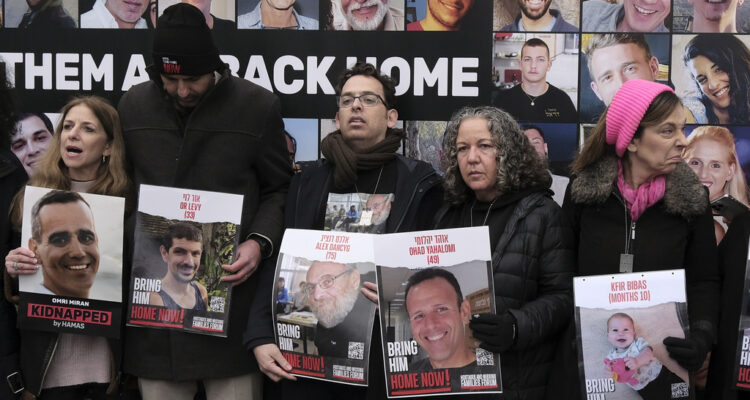‘It should be emphasized that there are still gaps between the sides,’ according to the statement from the Prime Minister’s Office.
By JNS
Mossad Director David Barnea traveled to Doha over the weekend to jump-start negotiations to secure the release of 120 Israeli hostages the Hamas terrorist group is holding in the Gaza Strip.
Upon his return, Prime Minister Benjamin Netanyahu’s office announced that a negotiating team would be dispatched this week to continue the talks.
“It should be emphasized that there are still gaps between the sides,” according to the statement from the Prime Minister’s Office.
Nevertheless, Hamas had apparently dropped its key demand that Jerusalem commit up front to ending the war as part of any deal, the Associated Press reported on Saturday, citing anonymous Egyptian and Hamas officials.
A Hamas representative said that the terror group was willing to relax this demand only after “verbal commitments and guarantees” from the mediators that Israel wouldn’t resume the war and that negotiations would lead to a permanent ceasefire.
However, Hamas indicated that it won’t be satisfied with these verbal guarantees. “Now we want these guarantees on paper,” the representative said.
Mediators are working to revive President Joe Biden’s phased deal proposal presented in May, which calls for an initial “full and complete” six-week ceasefire during which dozens of Israeli hostages, including women, the elderly and sick, would be exchanged for hundreds of Palestinian terrorists held in Israeli prisons.
During this first stage, Israeli forces would withdraw from densely populated areas of Gaza and displaced Palestinians would return to their homes in the northern Strip.
Meanwhile, Israel and Hamas would negotiate the terms of the second phase in which the remaining male hostages would be freed in return for Jerusalem releasing additional Palestinian terrorists.
In the third phase, the bodies of dead Israeli civilians and soldiers would be returned to the Jewish state and the reconstruction of Gaza would begin.
On Thursday, Netanyahu and Biden discussed by phone the modifications made by Hamas to the hostages-for-ceasefire framework.
The prime minister “reiterated the principles that Israel is committed to, especially its commitment to end the war only after all of its goals have been achieved,” according to an Israeli readout of the call.
Netanyahu has defined his government’s war goals as returning all of the hostages, eliminating Hamas’s military and governing capabilities and ensuring that Gaza will never again constitute a threat.
An anonymous senior Israeli official subsequently told the Axios news outlet that while “important progress has been made, there is still a significant way to go with serious challenges.”
As Israel and Hamas enter renewed indirect talks, “it will be tough and not short,” the official said, adding that it could take “several weeks to reach an agreement if we move to detailed negotiations.”
Jerusalem had immediately accepted the original Biden proposal, which Netanyahu stressed does not call for a permanent end to the war sparked by Hamas’s Oct. 7 massacre of some 1,200 people.
An Israeli official said on June 17 that in its initial reply to the proposal, Hamas made “substantial changes” to the outline, which the U.N. Security Council had formally approved a week earlier. The terrorist group demanded a “permanent” end to the conflict, the full withdrawal of Israeli forces from Gaza and financial guarantees the Strip would be rebuilt.





